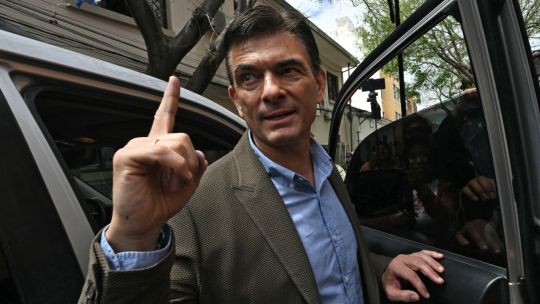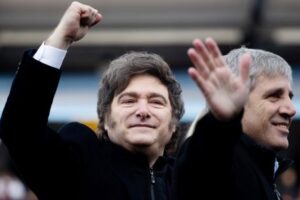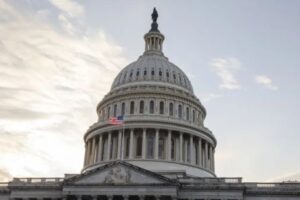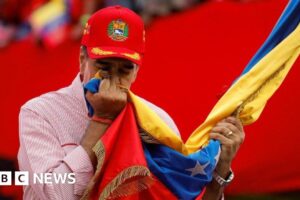
Bolivians on Sunday elected a pro-business centre-right senator as their new president, ending two decades of socialist rule that have left the nation deep in economic crisis.
With 97 percent of ballots counted, Rodrigo Paz had 54.5 percent of the vote compared to 45.4 percent for his rival, right-wing former interim president Jorge ‘Tuto’ Quiroga, the Supreme Electoral Tribunal (TSE) said.
Paz, the 58-year-old son of a former president, has vowed a “capitalism for all” approach to economic reform, with decentralisation, lower taxes and fiscal discipline mixed with continued social spending.
With dollars and fuel in short supply and annual inflation at more than 20 percent, weary voters snubbed the Movimiento al Socialismo (Movement Toward Socialism, MAS) party founded by former president Evo Morales in a first electoral round in August.
Bolivia is enduring its worst economic crisis in decades, with long queues now a common sight at gas stations.
“We hope the country improves,” homemaker María Eugenia Peñaranda, 56, said, bundled up against the cold as she cast her vote in La Paz, about 3,600 metres (11,800 feet) above sea level.
“We cannot make ends meet. There is a lot of suffering. Too much,” she said.
Sunday’s election closes out an economic experiment marked by initial prosperity funded by Morales’s nationalisation of gas reserves.
The boom was followed by bust, notably critical shortages of fuel and foreign currency under outgoing leader Luis Arce.
Successive governments under-invested in the country’s hydrocarbons sector, once the backbone of the economy.
Production plummeted and Bolivia almost depleted its dollar reserves to sustain a universal subsidy for fuel that it also cannot afford to import.
Patience ‘running out’
Analyst Daniela Osorio of the German Institute for Global and Area Studies said that Bolivians’ patience was running out.
Once the election is over, she warned, “if the winner does not take measures to help the most vulnerable, this could lead to a social uprising.”
Paz faces an uphill task, inheriting an economy in recession, according to the World Bank.
He had promised to maintain social programs while stabilising the economy, but economists have said the two things are not possible at the same time.
Like Quiroga, Paz also proposed cutting the universal fuel subsidy, keeping it only for public transportation.
‘Difficult to heal’
“If the people of Bolivia grant me the opportunity to be president,” Paz said as he voted Sunday, “my format will be that of consensus.”
Paz will not have a party majority in Congress, meaning he will need to make concessions to get laws passed.
Outside of Congress, the new president will also face stiff opposition from Morales, who remains popular especially among Indigenous Bolivians, but was constitutionally barred from seeking another term.
On Sunday, Morales told reporters the two candidates each represent only “a handful of people in Bolivia, they do not represent the popular movement, much less the Indigenous movement.”
Morales is the target of an arrest warrant for human trafficking over an alleged sexual relationship with a minor – an accusation he denies.
Arce is due to leave office on November 8 after serving a single presidential term that began in 2020.
Bolivia’s constitution allows for two terms, but he did not seek reelection.
Polling stations opened at 8am local time and closed eight hours later. Nearly eight million people were eligible to cast ballots in an election where voting is mandatory.
‘Capitalism for all,’ says Paz
Paz on Sunday became the third man in his extended family to be elected president, a role he has vowed to use for the betterment of all.
On the campaign trail, the 58-year-old economist worked hard to present himself as a moderate man of consensus.
Careful to avoid ideological labels, he had slogans for everyone: from “God, family, country” for his more conservative followers to “Until victory, always” – a catchphrase associated with Argentine revolutionary Che Guevara.
Paz, clean-shaven with thick, neatly combed-back hair and a penchant for collared shirts, has been described as a candidate trying to be everything to everyone.
In August, he came out of left field to take the most ballots in a first voting round that saw Bolivians deal a death blow to 20 years of socialist government blamed for a raft of economic woes.
Paz, the son of former president Jaime Paz Zamora (1989-1993), was born in Spain, where his family fled successive military dictatorships and where he spent his early years in exile.
There were also stints in Argentina, Chile, Peru and Venezuela, forcing Paz to start over several times as his family of leftist dissidents moved repeatedly to evade persecution.
“In my parents’ struggle for democracy, we lived in 10 different countries,” Paz said in an interview in August.
The candidate’s political lineage also includes great-uncle Víctor Paz Estenssoro, a leftist four-time president.
Since entering politics, he has been a mayor, a congressman and served until now as a senator for Tarija, an oil- and gas-rich department where his family hails from.
On the campaign trail, Paz toured hundreds of municipalities in the country of 11.3 million inhabitants.
With his bushy eyebrows, his strong physical resemblance to his father serves as a point of nostalgia for many old-school leftists, and Paz has featured the 86-year-old patriarch in posts on social media, where he is very active.
“I don’t have to define myself, but rather to offer the country an alternative,” Paz replied in an interview with CNN when asked for an ideological identification.
His message has been one of “capitalism for all, not just for a few,” with deep spending cuts, formalisation of the sputtering economy, and constitutional changes to bring back much-needed foreign investment.
He has promised to cut taxes and eliminate import duties. Rather than take out big loans, Paz has undertaken to “put our own house in order first, because there are many corrupt people here who have stolen a lot.”
He has said he will not seek a second term after this one.
Part of Paz’s appeal has been attributed to his running-mate, highly popular former police captain Edmand Lara, known for his broadsides against corruption.
“The popular sectors” have “strongly” identified with Rodrigo Paz, especially through his running mate Lara, who comes from a modest background, said Bolivian sociologist María Teresa Zegada.
– TIMES/AFP
related news
by Sandra Ferrer & Gonzalo Torrico, AFP





